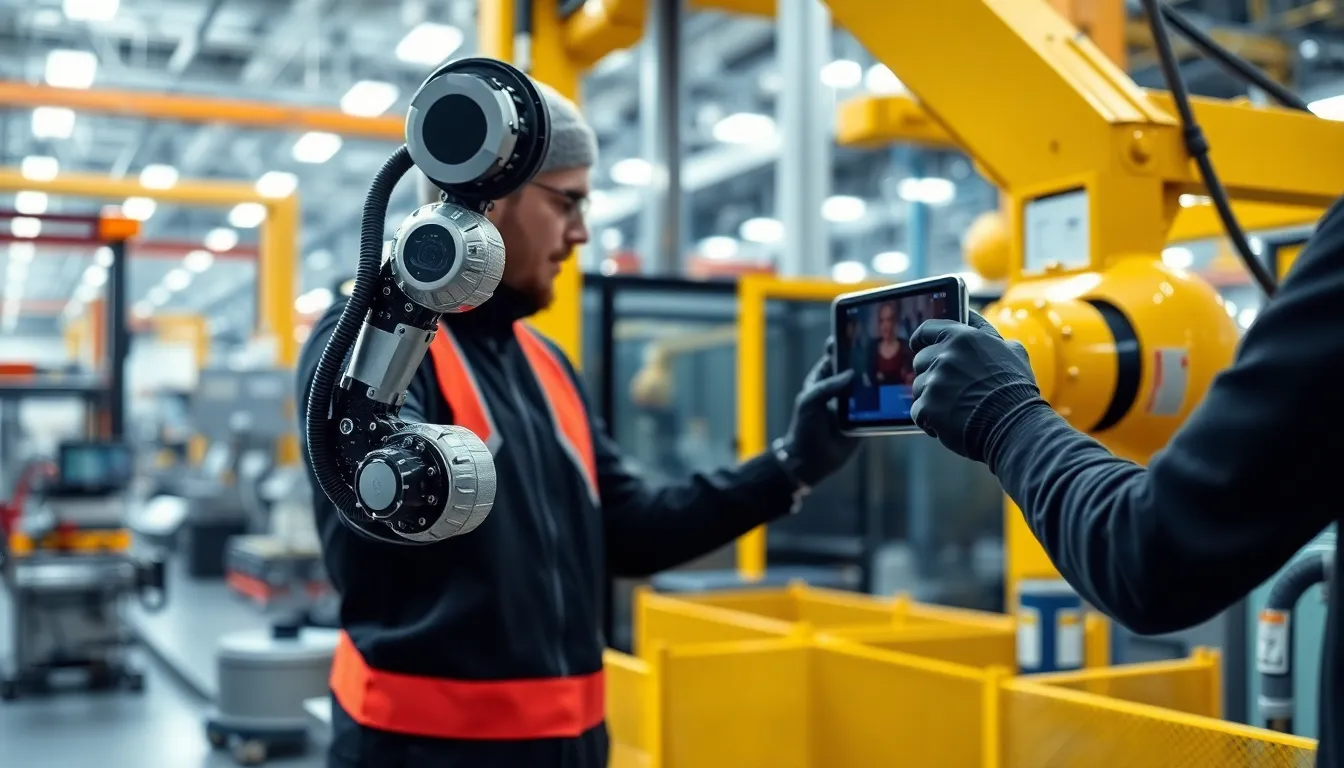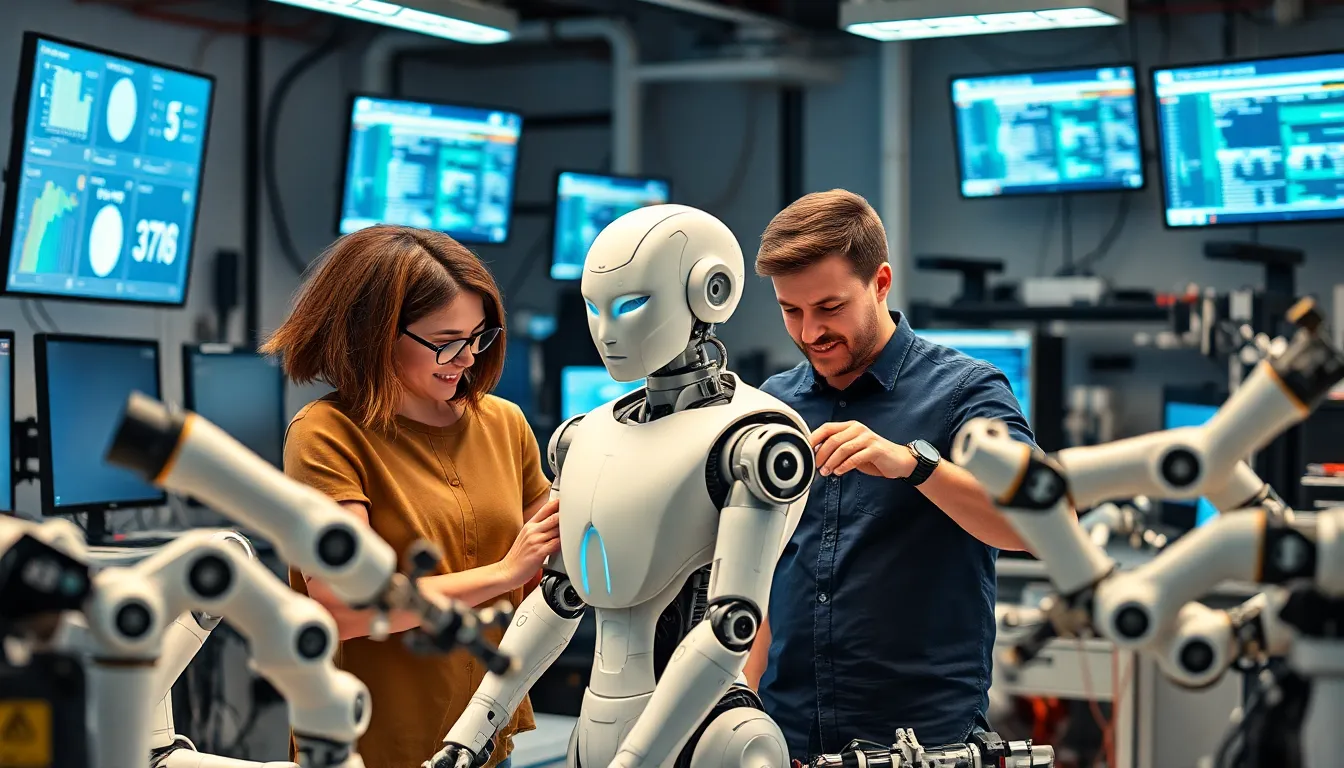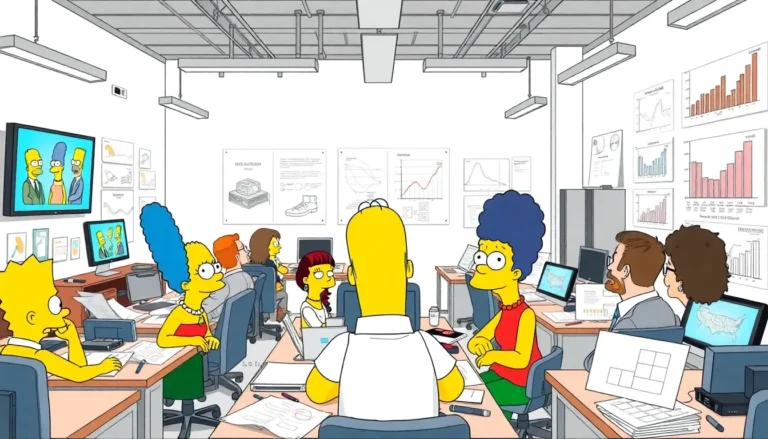Table of Contents
ToggleIn a world where robots are no longer just the stuff of sci-fi movies, the concept of robotic transformation is taking center stage. Imagine a future where machines not only assist in daily tasks but also revolutionize industries, making life easier and a bit more entertaining. It’s not just about shiny gadgets; it’s about how these intelligent machines can reshape everything from manufacturing to healthcare, and yes, even your morning coffee routine.
Understanding Robotic Transformation
Robotic transformation signifies a significant shift in how robots integrate into various aspects of life. It reshapes industries by introducing advanced technologies that enhance efficiency and productivity.
What Is Robotic Transformation?
Robotic transformation refers to the infusion of robotics into various sectors, impacting both processes and human interaction. This change transcends traditional automation to include intelligent systems that adapt to their environments. In many cases, robots now perform complex tasks previously thought to require human skills. Automation balances efficiency with human involvement, thereby optimizing workflows. Industries benefit from reduced costs and increased reliability, creating a landscape where robotics becomes essential to operations.
Key Technologies Driving Change
Several key technologies drive the evolution of robotic transformation. Artificial intelligence enables machines to learn from experience and make decisions independently. Machine learning algorithms process vast amounts of data, improving robots’ performance over time. Additionally, sensor technology provides real-time feedback, enhancing precision in automated tasks. Collaborative robotics introduces safe interactions between humans and robots, allowing seamless integration in workplaces. Cloud computing facilitates the sharing and processing of data across platforms, accelerating innovation. Each of these technologies plays a critical role in propelling industries forward in this robotic era.
Impact on Industries

Robotic transformation significantly reshapes various industries, pushing operational boundaries and enhancing productivity. This evolution manifests primarily in manufacturing and healthcare, where intelligent systems redefine traditional processes.
Manufacturing Sector
Robots streamline operations within the manufacturing sector. They perform tasks ranging from assembly to quality control with increased speed and accuracy. Automated systems reduce human error, leading to reliable production lines. In terms of workforce, collaborative robots, or cobots, work alongside humans, boosting efficiency and safety. Industries can rely on data-driven insights powered by artificial intelligence, which enhances decision-making and optimizes supply chains. Statistics show that automation can increase production rates by up to 30 percent, underscoring the crucial role of robotic integration.
Healthcare Innovations
Healthcare innovations directly benefit from robotic transformation. Surgical robots enhance precision during operations, minimizing recovery times for patients. Robotic systems assist in telemedicine, allowing doctors to remotely diagnose and treat patients effectively. Automation in hospital logistics, such as medication delivery and patient monitoring, ensures timely care. According to the World Health Organization, robotic solutions can improve patient safety by reducing the incidence of surgical complications. Additionally, robots provide support in elder care, promoting independence and improving quality of life for seniors.
Challenges and Concerns
Robotic transformation presents challenges and concerns that society must address as technology evolves.
Job Displacement
Job displacement remains a prevalent issue. Many individuals fear that automation will replace their roles, particularly in manufacturing and routine tasks. Research indicates that automation could displace up to 20 million manufacturing jobs globally by 2030. Positions requiring low skill may face the highest impact, leading to significant disruptions in the workforce. Training and reskilling programs are essential to mitigate these effects, enabling workers to transition into new roles effectively. Employers must prioritize workforce development to adapt to this changing landscape.
Ethical Considerations
Ethical considerations play a crucial role in the discourse around robotic transformation. As robots take on more responsibilities, questions about accountability and decision-making ethics arise. Concerns about data privacy become prominent, especially with robots utilizing personal information to enhance their functionalities. Ensuring transparency in algorithms and maintaining user consent remains vital. Additionally, the potential for bias in AI systems calls for ongoing scrutiny. Society must establish frameworks to ensure that robotic implementations respect human rights and promote fairness.
Future Trends in Robotic Transformation
Robotic transformation continuously evolves, driven by advanced technologies reshaping various sectors.
Advancements in AI and Machine Learning
Improvements in AI and machine learning boost robot capabilities. Intelligent systems analyze vast datasets, allowing for rapid adaptation and enhanced decision-making. Deep learning techniques enable robots to recognize patterns and improve efficiency in tasks, resulting in optimized performance. Significant breakthroughs in natural language processing facilitate better human-robot interaction, making communication smoother. As these technologies advance, robots become more autonomous, further integrating into everyday life and business environments.
Emerging Applications
Robotic transformation leads to diverse applications in numerous fields. In agriculture, drones equipped with advanced sensors assist in crop monitoring, improving yield quality. Retail environments benefit from autonomous robots managing inventory and enhancing customer experiences. Meanwhile, logistics operations utilize automated vehicles for efficient delivery and distribution. The education sector sees robots offering personalized learning experiences, sparking engagement among students. Each new application embodies the potential of robotic transformation, shaping a future that seamlessly incorporates technology into daily routines.
Robotic transformation is reshaping the landscape of everyday life and industries alike. As robots become more sophisticated and integrated into various sectors, they promise to enhance efficiency and improve quality of life. The advancements in AI and machine learning are driving these changes, enabling robots to perform tasks with increased precision and adaptability.
While the benefits are substantial, the challenges surrounding job displacement and ethical considerations cannot be overlooked. Addressing these issues through training and transparent practices will be essential for a balanced transition into this new era. As robotic transformation continues to evolve, its potential to redefine human interactions and operational workflows remains an exciting frontier.







